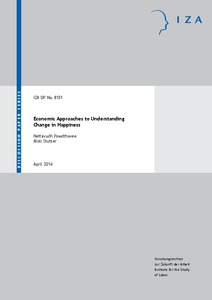Economic approaches to understanding change in happiness
"Are people condemned to an inherent level of experienced happiness? A review of the economic research on subjective well-being gives reason to the assessment that happiness can change. First, empirical findings clearly indicate that people are not indifferent to adverse living conditions when...
| Main Authors: | , |
|---|---|
| Institution: | ETUI-European Trade Union Institute |
| Format: | TEXT |
| Language: | English |
| Published: |
Bonn
2014
IZA |
| Subjects: | |
| Online Access: | https://www.labourline.org/KENTIKA-19119749124919379219-economic-approaches-to-underst.htm |
| Summary: | "Are people condemned to an inherent level of experienced happiness? A review of the economic research on subjective well-being gives reason to the assessment that happiness can change. First, empirical findings clearly indicate that people are not indifferent to adverse living conditions when reporting their subjective well-being as observed for limited freedom of choice, low levels of democratization, unemployment, low income, etc. Second, considering people's adaptation to life events and (external) conditions reveals substantial heterogeneity in the speed as well as the degree of reversion. Together, the evidence suggests that reported subjective well-being is a valuable complementary source of information about human well-being and the phenomenon of adaptation. Many challenges, of course, remain. First, we are only at the beginning of understanding variation in the process of adaptation. The modeling of happiness over the life course promises a productive perspective. Second, adaptation might well pose a challenge to individual decision-making when people are not good in predicting it. Third, adaptation might have great consequences for public policy and the idea of social welfare maximization depending on how fast and slow adapting people are treated." |
|---|---|
| Physical Description: | 24 p. Digital |

